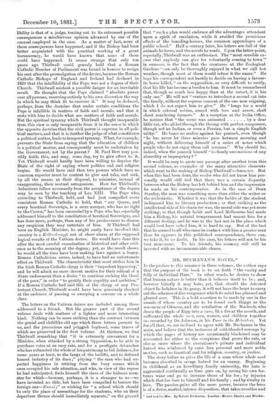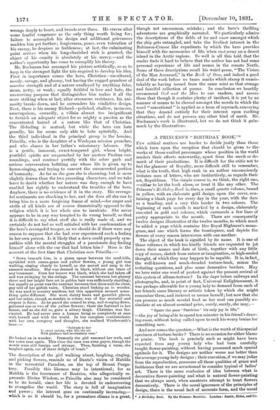MR. BUCH.A.N.A_N'S NOVEL.*
IN the preface to this romance in three volumes, the author says that the purpose of the book is to set forth " the vanity and folly of individual Hate." In other words, he desires to show that human nature is better than it believes itself to be ; and, however bitterly it may hate, yet, that should the detested object lie helpless in its grasp, it will not have the heart to carry out the schemes of dire vengeance which its mind has planned and gloated over. This is a bold assertion to be made by one in the annals of whose country are to be found such thipgs as the massacre of Glencoe, and the retaliation of the Macleods who drove the people of Eigg into a cave, lit a fire at the mouth, and suffocated the whole race, men, women, and children together (as recorded by Dr. Johnson, in his Tour in the IL-brides). Yet for all that, we are inclined to agree with Mr. Buchanan in the main, and believe that the instances of cold-blooded revenge by which the pages of history are occasionally blackened may be accounted for either as the exceptions that prove the rule, or else as cases where the executioner's private and individual hatred was reinforced by some less personal and more noble motive, such as fanatical zeal for religion, country, or justice.
The story before us gives the life of a man whose whole soul becomes absorbed in savage hatred for an enemy. Beginning in childhood as an hereditary family animosity, the hate is aggravated continually as time goes on, by seeing his own for- tunes wane and go to increase those of his foe ; by injuries which that foe does to himself and his family ; and by rivalry in love. The passion gains all the more power, because the hero is of a fierce, morbid, intense disposition, that takes troubles and
God and the Man. By Robert Buchanan. London : Meisra. Ohatto and Windom.
wrongs deeply to heart, and broods over them. He craves after some fearful vengeance as the only thing worth living for ; failure to accomplish his design and additional grievances madden him yet further ; forgiveness, peace, even toleration of his enemy, he despises as feebleness ; at last, the culminating point arrives when his long-cherished wish is granted, the object of his enmity is absolutely at his mercy,—and the author's opportunity has come to exemplify his theory.
Mr. Buchanan has arranged his picture artistically, so as to keep in the strongest light the trio required to develop his idea. First in importance comes the hero, Christian—uncultured, moody, savage, and gloomy, but having the rugged grandeur of massive strength and of a nature unalloyed by anything false, mean, petty, or weak ; equally faithful in love and hate, the unswerving purpose that distinguishes him makes it all the more striking when at last, after strenuous resistance, his ani- mosity breaks down, and he surrenders his vindictive design. Next, there is his enemy Richard—polished, shallow, insincere, unscrupulous, cowardly, a villain almost too insignificant to furnish an adequate object for so mighty a passion as the concentrated hatred of a nature like that of Christian. The ill-feeling is mutual, but while the hero can hate grandly, his foe seems only able to hate spitefully. And the third individual in the principal group is the heroine, Priscilla, who is the daughter of a Wesleyan mission preacher, and who shares in her father's missionary labours. She is a gentle, innocent, sweet-tempered girl, whose bright, youthful spirits are unquenched by her austere Puritan sur- roundings, and contrast prettily with the sober garb and serious conversation befitting one whose life is given up to hymn-singing, and trying to convert the unconverted portion of humanity. As far as she goes she is charming, but is more slightly drawn than the two preceding characters, and we take leave to doubt whether her nature was deep enough to have enabled her rightly to understand the troubles of the hero. Anyhow, there is no evidence of it in the story. His revenge- ful sentiments are shocking to her, and she does all she can to bring him to a more forgiving frame of mind,—for anger and strife of all kinds are of course diametrically opposed to the religion which it is her whole aim to inculcate. She never appears to be in any way tempted to do wrong herself, so that it is difficult to say what stuff she is really made of, and we certainly do not feel as well satisfied with her condemnation of the hero's revengeful temper, as we should do if there were any reason to suppose that she had ever experienced such a feeling in her own person. Is it likely that a dove could properly sym- pathise with the mental struggles of a passionate dog finding himself alone with the cur that had bitten him ? Here is the account of the first time that Christian sees Priscilla :-
"Down beneath him, in a green space between the sand-hills, sprinkled with canna-grass and yellow flowers, a young girl was walking, singing clearly to herself, as she moved and sang in the summer sunshine. She was dressed in black, without one trace of any "ornament. Even her bonnet was black, which she had taken off and was swinging by the strings. The contrast between her gloomy dress and her bright face set in golden hair was sufficiently startling; but equally as great was the contrast between that dress and the clear, gay trill of her girlish voice. Christian stood looking on in wonder. He was used to country maidens, but this apparition seemed some- thing quite different. She wore dainty boots and gauntlet gloves, and her attire, though so sombre in colour, was of fine material and elegant in form. As he gazed she ceased to sing, and stooping down, gathered one or two of the yellow flowers ; these she fastened to her bosom, and as she did so, gave a silvery laugh. Christian was fas- cinated. He had never seen a human being so completely at ease with herself and with the world. In her complete contentedness with her own company and thoughts, she realised Wordsworth's lines :—
Solitude to her Is sweet society, who fills the air With gladness and involuntary song.'
He looked on in wonder. Presently the girl resumed her walk, and her voice rose again. This time the tune was even gayer, though the words were still foreign and strange. Then, finishing a verse, she laughed again, oat of sheer delight of heart."
The description of the girl walking about, laughing, singing, and picking flowers, reminds us of Dante's vision of Matilda in the terrestrial Paradise, on the top of Mount Purga- tory. Possibly this likeness may be intentional; for as Matilda is the forerunner of Beatrice, who allegorically re- presents Divine Wisdom, so Priscilla also may be considered to be its herald, since her life is devoted to endeavouring to evangelise the world. The story is full of imagination and power ; the interest goes on continually increasing,— which is as it should be, for a premature climax is a great,
though not uncommon, mistake ; and the hero's thrilling • adventures are graphically narrated. We particularly admire the descriptions of the fields of ice and snow amongst which. the ship gets entangled, and take the liveliest interest in the - Robinson-Crusoe like expedients by which the hero provides himself with the necessaries of life, when cast away on a desert island in the Arctic regions. So well is all this told, that the reader finds it hard to believe that the author has not had some- personal experience of life and scenes in the remote North. Some of these descriptions recall his weird poem, " The Vision, of the Man Accursed," in the Book of Orm, and indeed a good deal of the work before us bears marks which stamp it unmis- takably as having issued from the same mint as that strange- and fanciful collection of poems. In conclusion we heartily recommend God and the Man to our readers, and assure- them that though it contains plenty of incident, it is yet by no manner of means to be classed amongst the novels to which the- word " sensational " is applied as a term of reproach, conveying that they depend entirely for their interest upon exciting situations, and do not possess any other kind of merit. Mr.. Buchanan's work is illustrated, but we do not think it gains much by the illustrations.







































 Previous page
Previous page